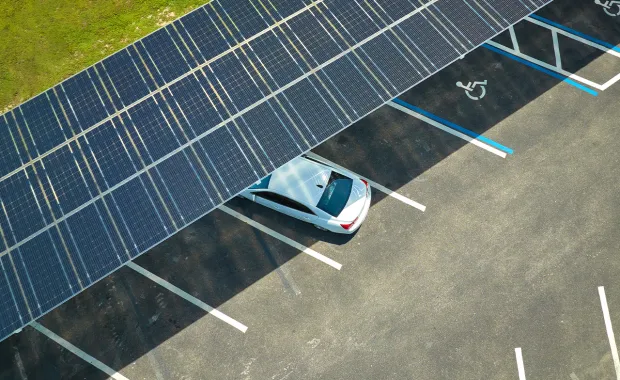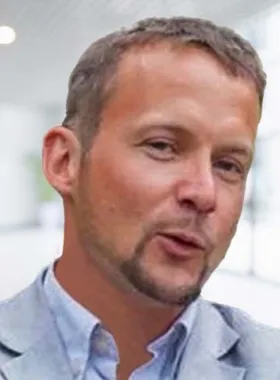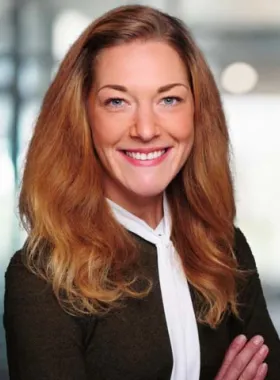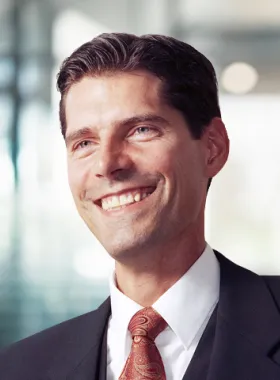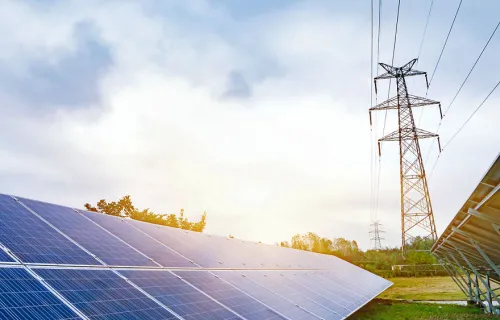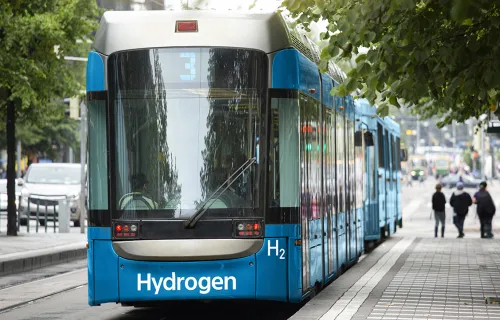- 1. Introduction
-
Andrea Grad:
Hello everyone, and thank you for tuning in today for our podcast all about energy transition and innovation. My name is Andrea Grad. I'm based here in Düsseldorf, Germany, and I'm part of the Unicorn Academy in which we work with national and international startups as part of our innovation initiative within CGI. Although I consider myself an innovative person, I'm not an energy or utility expert, which is why I brought my colleagues with me today, Karl Schmalz and Martin Tauer. Thank you for being here and talking to us a little bit more about the energy transition. Before we jump into the topics, why don't you go ahead and introduce yourselves? Karl, let's start with you.
Karl Schmalz:
My name is Karl Schmalz, from Germany. Here in Germany West and nearby Düsseldorf, there's a BU (CGI business unit), with an energy focus. We are dealing with a lot of clients here and within Germany, the renewable industry. I'm looking forward to having this podcast with you together and then giving it over to Martin to introduce himself.
Martin Tauer:
My name is Martin Tauer. I'm based in the CGI office in Bremen, in the northwest region of Germany. As a director of consulting, I have a team of 10 to 12 people in the energy and utility domain.
Andrea Grad:
Fantastic. Well, thank you both for making time and chatting a little bit more about this topic today. We have prepared a little bit for our listeners to chat some more again about energy transition. Before we go into the details of what we can do innovation wise, let's talk a little bit about the situation, what's going on in Europe and especially in Germany. Tell me a little bit more about where we stand.
Karl Schmalz:
Yes, the situation is that we have all the climate goals signed. Germany will have this climate net-zero goal by 2045 and the overall goal is 2050; they want to reduce it by half by 2030. This is a huge challenge to be net-zero. Net-zero means that you have the reduction of your climate goals to the 1990 figures. You can read it in every book; and then the situation is how to achieve it. As an industrial nation in Germany, we are looking for the renewables, how we can exchange the current energy producing coal and gas to maybe others like wind, solar and hydrogen.
This is a huge challenge to go there, and we are not sure if we can achieve it, but what we know is that everybody in Germany and the industrial sector is working to achieve this goal, and then I hope we will achieve it. Martin, what do you say?
- 2. Infrastructure matters
-
Martin Tauer:
Yeah, it's a hot topic, particularly here in the northwest region. As you know, there are a lot of goals and deadlines already communicated but, for example, in the small Bundesland (federal state), in Bremen, they are aiming at carbon neutrality by 2038 already. And, if you look further up to the north, Schleswig Holstein for example, they aim at 2040. So, it’s not very, very far away; but all this despite their own challenges—every state has on their way to reach that goal.
Bremen, for example, is a very small city. With lots of climate relevant infrastructure like seaports, logistics, handling, cruise terminals, tourism and even an own airport and above all, for example, a very relevant metal industry and particularly in this latter domain, they are planning to produce green steel by incorporating hydrogen in the production processes. This is a very, very urgent topic and a very, very high priority project, because the failure in this goal alone in this emitter, which is very important, would completely swat those ambitions for climatic neutrality for Bremen in 2038.
Andrea Grad:
That sounds like there's a lot going on, especially it sounds like there are very ambitious goals European-wide, Germany-wide, and then also in Bremen. But it sounds like you've already mentioned a bunch of renewable energies that we're trying to focus on. Can you elaborate a little bit more on those renewable energies that you were talking about?
Karl Schmalz:
Yeah, Martin mentioned already that hydrogen is one of these. We’ve seen solar and wind are very volatile and not stable at producing energy. Therefore, they use other solutions which could store energy or can be used as an alternative to gas. This is hydrogen here in North Rhine-Westphalia and Germany. Even in Europe it will be one Germany did not replace for nuclear. Here in North Rhine-Westphalia, there is a huge industry where they work with several setups for hydrogen, and I hope that we will go forward like this.
Martin Tauer:
Another thing talking about the transition, the active transition, which is working well in Germany is the integration and adaptation of photovoltaic production. I personally see it as a good way to stabilize the grid with large numbers of installations in private households. Whereas, for example, the wind energy will serve to stabilize the bigger consumers in the industry, for example, and feed hydrolyzers to, at the end, produce green hydrogen in notable quantities. But this, for sure, will truly take some additional time.
Andrea Grad:
Those all sound like great initiatives. Thank you, guys, for elaborating on these. Tell me a little bit more about solar photovoltaic. You talked a little bit more about electronic cars and stuff like that. Are there any further alternatives that we can talk about?
Karl Schmalz:
Yes, as Martin mentioned, wind and solar, there's also hydrogen and the challenge is to get the amount of hydrogen, or bridge technology, or bridge gas for industry scale. The last year was really challenging with the war to get not enough gas in Germany for production. This leads to a faster ramp-up plan for hydrogen and then a lot of companies and politicians are working to get hydrogen market ramp-up accelerated.
Then, this is a challenge to have the infrastructure in place to have new electrolyzers to have the industry available. Volume of hydrogen for industry usage is a bigger one because they identified that Germany is not able to produce this amount and then they need to get this volume from other countries or even from other continents.
Then, this is a challenge to replace the common gas with hydrogen. Besides this, it's also important for the net-zero that hydrogen has supporting impact to this goal and every company now has also to make clear that they're not only talking about hydrogen and net-zero, but they also have to prove it. There you come to, for example, ESG (Environmental, Social and Governance) reporting, in that they must prove what they do to achieve their goals.
- 3. Prepare for ESG reporting
-
Martin Tauer:
Yeah, talking about ESG, that's a good topic. What really concerns me is that whenever I'm getting in touch with representatives of the actual stakeholders driving this transformation, which are also tasked to significantly reduce their emissions, most of them are still not fully onboarded yet.
Small and medium-sized companies represent a significant economic force in Germany and shall, therefore, be deeply integrated in all decisions and ongoing developments. One of those elements is this so-called ESG reporting. While today, only a few companies are bound and obliged to perform this ESG reporting by 2038, a lot more companies, nearly 100% of the small and medium sized companies in Germany, will be obliged to deliver such a report. And today, I learned that the people are not yet prepared for it and have sufficient knowledge on how to do it.
Andrea Grad:
Well, this is all very, very helpful information. Do we want to elaborate a little bit more on the ESG reporting just to make sure that our listeners know exactly what it is about and what needs to happen for it to be completed as per the requirements?
Karl Schmalz:
Yes, this could be a helpful discussion to support companies to make their ESG reporting ready. But before this. I would like to say that CGI also has this net-zero goal and then, we sit on an internal group which is supporting the goal to get net-zero in 2030. It's also important what Martin mentioned that we have to prove it in the form of ESG reporting. We are developing internally as well our own ESG reporting and then making clear that we have this goal and the different initiatives set up internal of our company to achieve this.
Martin Tauer:
Aside from that, we are also actively involved with engagement at the World Climate Summit.
- 4. Sustainability at CGI
-
Karl Schmalz:
What we do in CGI with our net-zero is that, worldwide, we have set up different initiatives which are led centrally by a core group. Then, we are using our own developed IT and IP (intellectual property). Therefore, we identified several aspects. One is smart cities, smart buildings, and our car fleet are analyzed on what can be done to reduce our footprint in this time. What also is important is at our data centers, what are they producing? Also, what I mentioned with smart buildings, our heating. We set up an example in one country where we are measuring in the office our heating process and then what it means in terms of net-zero. Overall, it's really an interesting time to achieve this goal and to follow up on all these initiatives.
Martin Tauer:
As well as adopting new tools, for example, going back to the COP27 where CGI was there to integrate the metaverse, so avoiding travel, physical travel which is not only in the Corona (Covid 19) timeframe a big topic because everybody is now in hybrid work and therefore the emissions in transportation also went down a bit.
Andrea Grad:
Very good. That sounds like we have a lot of different initiatives going on just to support everyone achieving the goals that you guys mentioned earlier, European-wide, Germany-wise, North Rhine-Westphalia-wise. Let me ask you guys this, do you really think it's possible to reach the net-zero goal by 2045?
- 5. Scope 2 and 3 challenges
-
Martin Tauer:
Climate protection actions are concerning everybody as we are all on the same boat. Maybe at the EU level, interchangeable data formats, standardizations on regulations, for example, concerning smart meters, small power generators. Like in Germany, designated as Balkonkraftwerke as a technical basis and to optimize, for example, grid management and to install as well some more consciousness about everyone's private energy consumption.
Why are we talking about standardized regulations? If you take this before-mentioned ESG reporting guidelines with multiple frameworks and guidelines across the globe. Some of the demanded information is in strict collision with local regulations.
For example, scope 1 of the ESG reporting focuses on everything harmful during the processes you are directly responsible for, and which are happening under your direct control inside your company. This information is already 99.5% readily available in your local computer IT ERP systems. It's basic work, and maybe some years ago a colleague, environmental protection officer or whoever did this with Microsoft Excel reporting hazmat—for example, consumption waste quantities and so on.
If you have a look at scope 2 of ESG, which aims at energy consumption here, for example, hybrid work situations or companies allowing remote office work are in strict collision with personal data protection rights. The GDPR, for example, because you would normally be obliged to interview all your remote working colleagues on the kind of electricity contract they have, their consummation quantities and so on, which is normally not possible.
A large challenge will be, for example, all the reporting activities for scope 3. Here you will be obliged to report, in addition to robust checks concerning your complete pro supply chain, on the way your product is used when you hand it over to the final customer; and questions like what does the customer do with your product? At the end of its lifecycle, is it properly disposed of at the end and how much of your product is going to be recycled or not?
- 6. Sustainability at CGI
-
Martin Tauer:
You see this is a very complex topic. In addition, we face the ongoing actual events in the world like the war in Ukraine. This was, looking back, a huge risk disruptor not only for gas pipelines surely, but for sure the LNG import, which shall only be seen as an intermediary step to my opinion within the context of the green energy transition.
We are now developing and reinventing a new energy market towards storing electrical energy or green energy in the form of hydrogen. We are building up a totally new transportation ecosystem ranging from the Netherlands up to Latvia, and it's a huge challenge with huge investments in not only monetary but also in infrastructure.
Finally, a last thought about pricing and increasing energy costs. A key to successful dealing with this huge challenge of the energy transition is keeping the end user and consumer prices relative, dependable while prices at the central wholesale exchanges are behaving somewhat radically. Therefore, consumption must be somewhat moderated and aligned with the actual market situation.
Dynamic prices throughout the day are no longer a tale of the future using this approach also, in my home, with the result that my previous consumption has changed towards a more considered consumption.
You consume a lot more carefully and are a bit more aware of impacts and everything which is linked to it. For example, you discover new approaches by integrating intelligent home automation and other IOT systems, for example. I’m saving today almost 20% of my energy bill compared to suppliers having a fixed price technology behind their energy, even though in times of strong price increases for energy in general.
Karl Schmalz:
Yeah, I think what Martin already mentioned is new technologies need innovation and then we have to follow the trends on the market and to bring this innovation to the client at the end; and, also, to the consumers and that they're also ready It is not only that the industry is using it, but also the consumers are going to the right direction of innovation and new systems.
Andrea Grad:
I mean, summarizing everything we just talked about, all great points, and Martin, I really like your metaphor of trying to get everybody in the same boat. It sounds like some of the issues that we are dealing with and trying to get on the same page with are consumption, political issues, of course, energy prices, and lastly, having to bring innovation into the boat to ensure that the winds follow where we want them to go and keeping our fingers crossed that we're going to be able to reach that goal.
With everything that you just reported, our listeners are probably curious to find out what the future holds and what we are doing at CGI to help, somewhat, remedy this situation.
- 7. Hydrogen initiatives
-
Karl Schmalz:
There are several initiatives running and then I will go to mainly one or two of them. One that is very worldwide looking is a hydrogen initiative. We see that hydrogen is more coming up then in Germany, especially it's the market ramp up that they need hydrogen to replace the common gas situation and to have a new energy place and then use it in several ways for burning, for storage, for e-fuels.
Therefore, we are a partner here, in the west, with a hydrogen hub where we look up for startups that we support bringing new ideas, new technology, just innovation to bigger projects, to bigger companies. This is one what we have here in mind as well. We are running in different initiatives here in Rhineland to ramp up a hydrogen blueprint in rural areas, how to use hydrogen from mobility perspectives, from usage in buildings as usage for cities.
It is interesting what's coming up next there. Several topics are at the very beginning, but there are also some bigger projects which you can see. They have to connect it with other projects so that the producers, when they produce more hydrogen, not everybody knows where to get this hydrogen and, therefore, we are there for digitalization and information management to bring the producers, the transporters and the consumer together. This is one part of it.
On the other hand, we are also dealing with renewables. We also have a big look at what was mentioned before on wind and solar. CGI itself has a huge solution to monitor and operate wind and solar plants. Therefore, we are in worldwide discussions where we can support the renewable initiatives to exchange old energy production with new renewables.
This all should lead to sustainability that we achieved the goal, what we mentioned before for the net-zero and sustainability. And then there's also huge initiatives running within CGI.
- 8. Innovation examples at CGI
-
Martin Tauer:
Not to forget, in addition, the competencies we have in the domain of sustainability. We cover everything from ESG reporting solutions, control hubs for renewable energy generation, or energy market tools using, for example, artificial intelligence. We also, sometimes, have surprising solutions like develop an app to reward the best and most economic drivers in the car fleet, for example, to save fuel consumption or, for example, prevent the spilling of food residues in canteens and large organizations with an application developed particularly for that. This shows that we have a very good understanding and a wide area of action.
Andrea Grad:
Oh, absolutely. I mean these are great topics that we hear all over the place. Everybody talks about hydrogen digitalization, innovation, sustainability, so all great topics and it sounds like you guys are doing a lot to help move these topics forward. Thank you for elaborating on it. Without knowing too much about energy and utilities, I feel like I've learned a lot in today's podcast, so I thank you both.
I guess that kind of leaves it up to me with the Unicorn Academy, just to tie it back to the beginning. We work with local startups, right? Martin, what you just mentioned, the IOT, the chatbots and IDP, intelligent document processing, if you ever have a need in any of those areas, feel free to hit us up and we might have a startup to help you guys out with as well.
Again, thank you guys very much for your time and for being so thorough in your responses and teaching us everything you've taught us today. Just to summarize it up, we have learned a lot. CGI has very ambitious goals. Our net-zero goal is hopefully to be accomplished by 2030. We're hopeful that we might be able to reach this goal, and hopefully the wind blows into our sails. Everyone should pay attention of course to their consumption. With that in mind, customers and companies should listen to the experts like Karl and Martin here today. If you have any questions, feel free to contact us.
It’s not only about utilizing the standards in the industry, but also trying to find someone who's willing to look outside of the box and use innovative initiatives like we do. Karl and Martin, in conclusion, I'm going to leave it up to you. Is there anything else you would like to hint to the listeners to summarize this up?
Karl Schmalz:
Yeah, we know that a lot of work is ahead of us and what you need in your life is every time a little bit more luck. In Germany, especially in the old coal area in North Rhine-Westphalia, you have a slogan that you say, okay, how you wish everybody luck in the future and to achieve their goals. In Germany, you can say glück auf!
Martin Tauer:
Glück auf!
Andrea Grad:
Thank you. Well, with that to everybody out there, good luck with your journey. Let's all work together to accomplish our goals. And again, if there's anything you need, if you have any questions, feel free to hit us up. Take care, guys.
Martin Tauer:
Thank you.
Karl Schmalz:
Thanks a lot.
